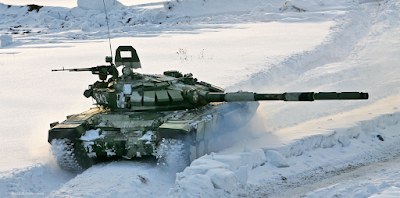There is an Irish saying that Russian president Vladimir Putin might want to heed: England’s difficulty is Ireland’s opportunity. At last count, there are more than twenty major separatist movements in Russia alone, not to mention the significant number of dissatisfied, even outraged people in the former Soviet republics, such as Belarus and Kazakhstan.
Then there is the growing resistance to Putin from Russians themselves inside the country. Putin is losing popularity in his own country and may be using the tried-and-failed technique of using an external war to try and bring people together to support him domestically against alleged foreign aggression. As the totalitarian state in George Orwell’s 1984 had it, “War is Peace.”
This would account for Putin’s insistence that Ukraine and the West are the aggressors, even as he invades Ukraine and recognizes the “independence” of the two separatist regions as he continues to make them completely dependent on an increasingly reluctant Russia for their existence. The next step is clearly annexation à la Crimea, as Putin’s pet Duma (the Russian federal legislature) hastens to approve whatever he demands.
This is a dangerous game to play, as the United States knows to its cost. During the First and Second World Wars, the American people came together in the face of foreign attacks. Even in the Korean “Police Action,” there was a perceived direct threat to the United States. When America got involved in Vietnam to support an unpopular regime, few people saw any real threat to U.S. interests, and the resulting demoralization caused divisions among Americans that have only increased over the years.
Neither has Russia a very good track record with its foreign entanglements. The Russo-Japanese War in the early twentieth century sparked a revolution in 1905, which planted the seeds of the 1917 revolution. The fiasco in Afghanistan — yes, the Russians were there first — seriously weakened the Soviet regime.
 |
| You-Know-Who is watching you. |
If Putin is indeed using the Orwellian tactic to bolster his power, he may be making a bet that he can’t cover. Yes, he has massed an estimated 190,000 troops on the border of Ukraine and is even now carrying out the latest phase of his ongoing invasion (as Western politicians dither over whether to call it a real invasion — it's been "real" for nearly a decade). Russia has an estimated 1 million active duty troops and 2 million reservists, but consider —
Since the 1990s when Putin inherited the Chechnyan situation, the tiny Chechnyan army of approximately 5,000 kept upwards of 90,000 Russian troops tied down for decades in the First and Second Chechnyan Wars. Fighting still continues, although on a much-reduced scale as Putin’s pacification of the region destroyed cities and resulted in hundreds of thousands of military and civilian casualties. Many Russians and surviving Chechnyans insist that Putin is a criminal for the brutal way he used war to bring peace.
 |
| "And I'm watching him AND you." |
Let’s run some numbers. Obviously, this is hardly a human way to look at the situation, but let’s do a cost-benefit analysis for Putin. After all, common humanity and decency don’t seem to have any influence on him, but concern for his own skin might.
As we noted above, there are more than twenty major separatist movements in Russia alone. Let’s suppose that less than half of them decide to rise in rebellion and demand independence . . . especially since Putin has so kindly made the independence of separatist factions in Ukraine (created, encouraged, funded, and supported militarily by Putin) a justification for war. Let’s further suppose that they support their demands with force of arms. After all, with the example of Putin’s pacification of Chechnya before them, they might decide they have little to lose.
 |
| "Nothing to see here, move along, it's not an invasion." |
Let us further suppose that Putin realizes he cannot carry on prolonged conflicts anywhere else if he wants to support his ongoing invasion of Ukraine. He therefore takes immediate steps to crush the ten rebellions as soon as possible, and mobilizes all active duty personnel and calls up all the reserves, for a total of 3 million troops.
We reduce that by 800,000 to garrison Russia’s numerous military bases, foreign and domestic, and the 200,000 positioned on Ukraine’s border. We’re assuming that Putin has committed the maximum active duty force he could to intimidate Ukraine and the West (or he wouldn't have moved troops from Crimea), thereby necessitating calling up the reserves if anything else happens anywhere. That leaves the 2 million reservists to deal with ten rebellions, or 200,000 each. This accounts for the total estimated strength of Russia’s military.
 |
| "We're tourists and this is just our SUV." |
We read a week or so ago that if Putin carries out an actual invasion of Ukraine (as if he already hasn’t been doing so for the past eight years), it would take an estimated troop strength of between 4-500,000 to carry it off. If only ten of the twenty separatist movements rebel at this time, Putin will either have to strip the garrisons of the military bases to obtain the addition 2-300,000 troops for Ukraine, or forgo an all-out effort to suppress the rebellions. If twenty or more separatist movements rebel, Putin is faced with nearly two dozen Chechnyas, each tying down 100,000 troops for decades with no reserves, hideous civilian and military casualties, and the very real possibility of a revolution to overthrow him as the cost and the body count rises for two dozen completely unnecessary wars.
 |
| "I wouldn't THINK of betraying Hong Kong, I mean, Russia." |
Now, with China’s expansionary policies under Xi, does Putin think his friend in China is going to pass up a golden opportunity? Hardly. And then there is something Putin may not have considered.
A few weeks ago, French scientists sustained a fusion reaction for five seconds, and could have gone longer had the technology been adequate. They’re estimating fusion power can be commercially viable by 2030. Right now, Putin thinks he can hold Europe hostage because of their need for Russian oil and natural gas.
Think again, Mr. Putin. Faced with virtually unlimited cheap energy in less than ten years, other oil producing countries may decide to get while the getting’s good. If they look to their own advantage, they’ll sell as much oil to Europe as they can before the market disappears forever, and make a few friends in the process.
Are you really as smart as you think you are, Mr. Putin?
#30#


